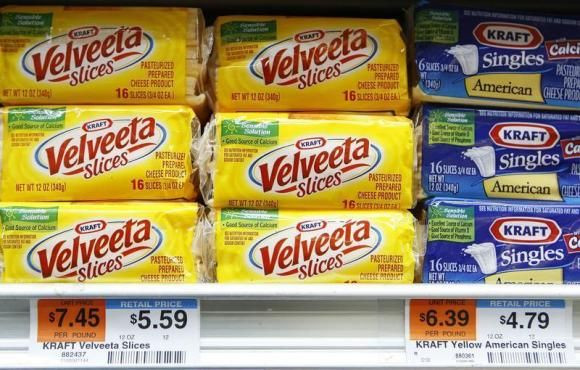Velveeta Shortage A Publicity Stunt? Twitter Is Suspicious, But Kraft Foods (KRFT) Says Cheesepocalypse Not Planned

Widespread reports of a supposed Velveeta shortage sliced through social media on Wednesday, but some Twitter users think the whole thing sounds like a cheesy marketing ploy.
Velveeta, the processed cheese product owned by Kraft Foods Group Inc. (NASDAQ:KRFT), was a trending topic throughout much of the morning, with news outlets warning that supplies of the gold stuff are “running low” and causing a “meltdown.” The newly created portmanteau “Cheesepocalypse” was bandied about on Twitter throughout much of the morning.
But numerous tweeters expressed skepticism about whether the reported shortage was a real concern or merely a keenly planned PR stunt meant to drum up demand for Velveeta just a few weeks before Super Bowl XLVIII. Many called the story’s timing so obvious that it barely warranted entertaining.
Does anybody think this Velveeta story wasn't completely manufactured by @kraftfoods to get publicity? HT @nypost http://t.co/TBnHKtZOiB
- John Dabkovich (@JohnDabkovich) January 8, 2014Pretty damn sure the Kraft velveeta shortage is a publicity stunt to drive up first quarter sales.
- Ryan Dinger (@RyanfromJersey) January 8, 2014I'm calling BS on this story (publicity stunt) ... http://t.co/SlbzfXwp6V
- Dan Ingham (@InghamKWTX) January 8, 2014Kraft warns snackers of Super Bowl Velveeta shortage http://t.co/JXfBNHKgrT Sounds like a PR stunt to me. And if so, it's pretty brilliant.
- Loren Waldron (@lchecks) January 8, 2014No, I will not be sharing the Velveeta "shortage" PR stunt story.
- Micah Grimes (@MicahGrimes) January 8, 2014I wonder what Super Bowl party must-have is going to have a "shortage" as a PR stunt next, a la Velveeta...hmmm...
- Matt Lindner (@mattlindner) January 8, 2014The suspicion is understandable given that this is the second Super Bowl season in a row in which headlines were dominated by the potential scarcity of a favorite snack food. Last year, football fans fell into a virtual panic over reports that Buffalo wings were in short supply. Those reports began with a January 2013 press release from the National Chicken Council, which stated that increased demand and a reduced supply had pushed the wholesale price of chicken wings to an all-time high. While the release also said that “consumers shouldn’t worry about any wing shortage,” that quantifier was absent in many of the stories that reported on the ensuing “crisis.”
The Cheesepocalypse phenomenon seems to have similarly questionable roots. The story began with an article on AdAge.com from E.J. Schultz, who reported that “Ad Age contacted Kraft … after reports of a shortage at a few East Coast grocery stores.” In turn, Jody Moore, a Kraft spokeswoman, confirmed to Schultz that “it is possible consumers may not be able to find their favorite product on store shelves over the next couple of weeks.” She added that it’s a short-term issue, driven largely by high demand, and that Kraft really hasn’t “heard much from consumers about it at all.”
Reached by phone, Schultz declined to name the stores that first reported the shortage or how many there were, saying simply that “everything we reported is in the story.”
Kraft’s director of corporate affairs, Russ Dyer, told IBTimes in an email that any region could be affected and reiterated that shortage was a short-term issue with minimal impact. He added that, despite the rampant Twitter suspicion, the Cheesepocalypse was not a premeditated publicity stunt.
“Media has certainly had some fun with the quirkiness of the story, but this is something we did not proactively pitch out,” he said. “The original story ran after a reporter, who had heard of shortages from certain East Coast retailers, came to us and asked.”
So why all the fuss over a shortage at a few East Coast grocery stores? That’s a little harder to answer, but Dyer’s point about the media simply having fun with a quirky story is as good a guess as any. On the Internet, nothing spreads faster than a good panic -- not even a melted slice of processed you-know-what.
In the meantime, the issue is not having the best short-term impact on Kraft’s bottom line. TheStreet.com reported on Wednesday that shares of Kraft stock fell 0.8 percent to $53.47 amid rumors of the shortage.
Got a news tip? Email me. Follow me on Twitter @christopherzara.
© Copyright IBTimes 2024. All rights reserved.






















